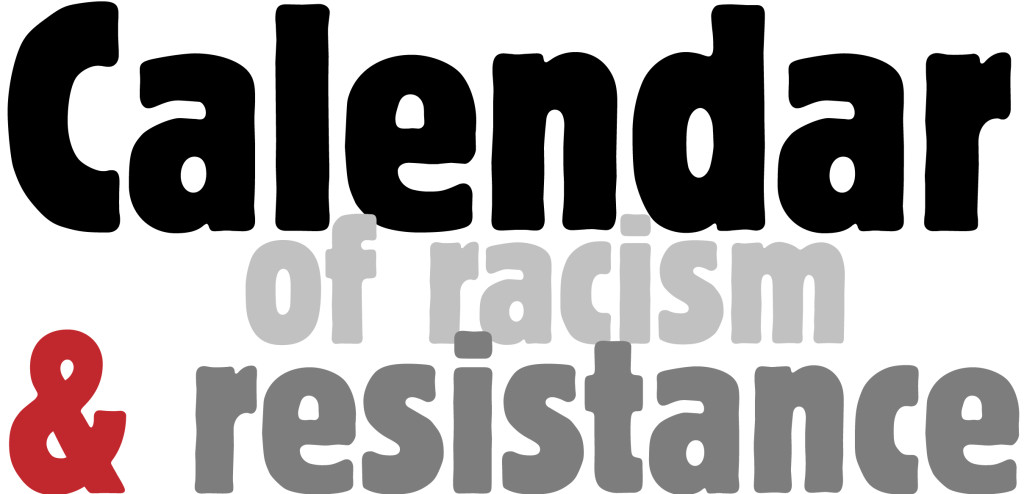A fortnightly resource for anti-racist and social justice campaigns, highlighting key events in the UK and Europe.
We have incorporated the Covid-19 roundup of racism, health, policing and civil liberties into the calendar of racism and resistance, which we believe makes developments during this period clearer and easier to understand.
INTERNATIONAL
22 April: According to the UN World Food Program, the pandemic, which is already slowing efforts to deal with the historic locust plague ravaging the East and Horn of Africa, means that a further 130 million people could go hungry in 2020, in addition to the 135 million people already facing acute food shortages. Altogether, an estimated 265 million people could be pushed to the brink of starvation by year’s end. (New York Times, 22 April 2020)
HEALTH AND POLICY
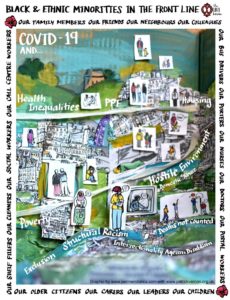
22 April: Research by the Guardian indicates that people from minority groups are over-represented by as much as 27 per cent in the coronavirus death toll, and that Harrow, Brent, and Barnet, which have high BAME populations, are among the five local authorities with the highest death rates in hospitals and the community. (Guardian, 22 April 2020)
24 April: Labour Party leader Keir Starmer appoints Baroness Doreen Lawrence as the party’s race relations adviser and tasks her with launching a review into the impact of Covid-19 on black, Asian and minority ethnic communities. (Independent; Labour List, 24 April 2020)
27 April: Sixteen British medical associations, representing thousands of BAME medics, write to the health secretary and Public Health England (PHE) asking that Trevor Phillips be removed from its review into Covid-19 BAME deaths, and for a more suitable candidate ‘trusted by healthcare professionals from a BAME background to be installed’. Phillips is currently suspended from the Labour Party over allegations of Islamophobia. (Sky News, 27 April 2020)
28 April: Doctors of the World, working with the British Red Cross, translates NHS guidance on Covid-19 into 51 languages, and launches a survey for those working with migrants to find out what else would be useful. (Doctors of the World, 28 April 2020)
29 April: NHS England issues new guidance to health trusts over concerns that workers from BAME backgrounds could be at greater risk of coronavirus, suggesting that they should be ‘risk-assessed’ and reassigned away from the frontline where possible, to reduce their disproportionately high death rate. (Guardian, 30 April 2020)
29 April: Labour expresses concern over guidance issued by the chief coroner for England and Wales telling coroners not to address failure to provide PPE in inquests of key workers. (Guardian, 29 April 2020)
1 May: The Kings Fund and public health experts call for government to prioritise health funding on deprived areas as the Office for National Statistics reveals that the Covid-19 death rate is twice as high in England and Wales’ poor areas as in rich ones. Newham has the highest death rate in England, followed by other London boroughs, Brent and Hackney. (Guardian, 1 May 2020)
1 May: The Institute for Fiscal Studies finds that the death rate among British black Africans and British Pakistanis from coronavirus in English hospitals is more than 2.6 times that of the white population, and that deaths of people from a black Caribbean background are 1.7 times higher. (Guardian, 1 May 2020)
4 May: PHE publishes the terms of reference for its rapid disparity review into how different factors, including ethnicity and deprivation, can impact on health outcomes from Covid-19, with available data on health outcomes for NHS staff also to be analysed. It will be led by Professor Kevin Fenton, Public Health Director for London, with the support of a wide group including Trevor Phillips.  (PHE; Guardian, 4 May 2020)
(PHE; Guardian, 4 May 2020)
6 May: The IRR reveals that the consultancy run by Trevor Phillips with Richard Webber, which is advising PHE on its Covid-19 BAME deaths review, works on software to identify ethnic groups specialising in different types of crime. (Guardian, 6 May 2020)
POLICING
For more information on policing and civil liberties issues follow @NETPOL @BigBrotherWatch @COVIDStateWatch and @libertyhq.
POLICING CORONAVIRUS
21 April: A young woman is detained in police custody for 4 hours in Toulouse, France, for displaying a banner that reads ‘Macronavirus, when does it end?’ (Ouest-France, 24 April 2020)
22 April: After disturbances over four nights in the Paris suburbs of Villeneuve-La-Garenne, Nanterre and Clichy, police say they will not shy away from enforcing the coronavirus lockdown in the high-rise Paris suburbs as the government accuses drugs gangs of fuelling the violence. The disturbances started after a motorcyclist was hit by a police car and hospitalised, with bystanders claiming the police hit him deliberately. (Reuters, 22 April 2020)
22 April: The Human Rights League is appealing the decision of Christian Estrosi, mayor of Nice, to enforce an 8pm curfew in eight poorer districts of the city, calling the measure ‘targeted and discriminatory’, as the rest of the city has a 10pm curfew. (Liberation, 22 April 2020)
27 April: ROMEA reports that five Romani children from the Slovak settlement of Krompachy, currently under Covid-19 quarantine, were beaten by police and threatened with being shot after they went to collect wood and play near a stream in a location where soldiers had previously allowed them to go. The children’s mother posted images of their injuries on Facebook. Watch a video here. (Romea, 29 April 2020)
27 April: 29-year-old Brussels resident Kezy Mampassi files a complaint about the disproportionate use of force by police during his arrest in a coronavirus check last week. (Brussels Times, 27 April 2020)
27 April: UN High Commissioner for Human Rights Michelle Bachelet warns that coronavirus restrictions must not violate human rights, and says that ‘excessive and at times lethal force’ is being used ‘against people belonging to the poorest and most vulnerable segments of the population’, with mass arrests in some countries over curfew violations ‘both unnecessary and unsafe.’(Agence France Presse, 27 April 2020)
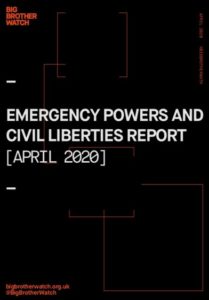 28 April: Big Brother Watch publishes its first monthly report on Emergency Powers and civil liberties during lockdown. Download the report here. (Big Brother Watch, 28 April 2020)
28 April: Big Brother Watch publishes its first monthly report on Emergency Powers and civil liberties during lockdown. Download the report here. (Big Brother Watch, 28 April 2020)
29 April: The Mobile Info Team Thessaloniki reports that 81 homeless migrants have received 123 fines between them for breaking coronavirus restrictions by being in the streets, mostly when they seek food, shelter or to bathe, with police stationing themselves outside refugee camps – the only place to shower. Some have been fined for failing to send a correctly worded SMS request for permission – a lockdown requirement. (Mobile Info Team, 29 April 2020)
29 April: Activist groups in Berlin are set to ‘flood the streets with anti-racist, anti-patriarchal and anti-capitalist content’ during ‘decentralised’ May Day demonstrations. German police will be tested by the conflict between the law forbidding covering the face while attending gatherings, and the compulsory wearing of masks in shops and on public transport during the coronavirus outbreak. (Guardian, 29 April 2020)
30 April: The National Police Chiefs Council says nearly 200,000 calls from the public have been received reporting on people allegedly flouting coronavirus rules. (Guardian, 30 April 2020)
SURVEILLANCE AND CIVIL LIBERTIES
3 May: Legal experts warn that a mandatory Covid-19 symptom tracker app would require a ‘clear and detailed legal basis’ set out in legislation if it is to comply with human rights and data protection laws. (Guardian, 3 May 2020)
POLICING – GENERAL
23 April: The number of offences involving knives recorded by police in England and Wales in 2019 was the highest on record, new statistics published by the Office for National Statistics show, with big cities driving up the numbers. Police recorded 45,627 offences involving knives or sharp instruments in 2019, a 7 per cent rise year on year, and 49 per cent higher than 2011 when comparable records began. (Guardian, 23 April 2020)
27 April: French prosecutors launch an investigation after film of three police officers is posted on Twitter showing them making racist remarks about an arrested man whom they pulled out of the Seine in Seine-Saint-Denis, north of Paris, the day before. One officer used an offensive word for a North African while another said ‘They sink. You should have attached a weight to his ankle’. (Guardian, 27 April 2020)
30 April: Cambridgeshire and Essex rural police are accused of failing to remove racist abuse targeting the Gypsy, Roma and Traveller community from their Twitter feeds, with campaigners using the police force’s own online hate crime reporting system to report them to themselves. (inews, 30 April 2020)
30 April: The Office for Police Conduct discontinues its misconduct investigation into the conduct of Greater Manchester Police following the death of schoolboy Yousef Makki in Manchester last year. (Guardian, 30 April 2020)
30 April: Home Office figures show that 3,000 police officers have been recruited since Boris Johnson pledged during his election campaign to recruit an additional 20,000 officers by 2023. (Guardian, 30 April 2020)
PRISONS
30 April: A report by the Council of Europe’s Committee for the Prevention of Torture condemns guidance allowing the use by officers in male prisons including Liverpool, Doncaster and Wormwood Scrubs of ‘pre-emptive strikes’ involving punching compliant prisoners to impose discipline. (Council of Europe; Guardian, 30 April 2020)
ASYLUM, MIGRATION AND CITIZENSHIP
ASYLUM AND MIGRATION RIGHTS
23 April: Workers at the Greek Migration Ministry’s Asylum Service declare an indefinite strike over the ministry’s failure to renew contracts for 17 employees, meaning further limbo for asylum seekers in the country. (Ekathimerini, 24 April 2020)
23 April: Leading migrant rights charities in the UK accuse the Home Office of ‘fundamentally failing’ to adapt immigration policies to protect public health as the department confirms it will continue to require asylum seekers to submit claims in person. (Independent, 23 April 2020)
25 April: Home secretary Priti Patel announces that the continuation of the ‘immigration health surcharge’, which must be paid alongside UK visa fees by all non-settled foreigners and has just gone up by over 50 percent, is under review for migrant workers in the NHS. (Independent, 25 April 2020)
29 April: The Home Office announces that all frontline health, care and social workers, midwives and pharmacists whose visas expire before 1 October, and their families, will be automatically granted a year’s free extension and will not pay the health surcharge, and bereaved families of those who have died will be granted indefinite leave to remain. (Home Office; Free Movement, 29 April 2020)
29 April: Lawyers and campaigners express concern over Home Office data revealing over 3,700 unresolved Windrush cases, 1,000 of which have not yet been considered by the Windrush taskforce two years after then home secretary Amber Rudd resigned amid the emerging scandal. (Independent, 29 April; Guardian, 30 April 2020)
2 May: Migrant rights charities in the UK warn that thousands of couples and families could be separated due to job losses during the pandemic leaving them unable to meet the minimum income requirement of £18,600 per annum for spouse visas. The Home Office prompts outrage with claims that families and couples should rely on ‘investments and cash savings’ to meet thresholds. (Independent, 2 May 2020)
3 May: Dozens of migrant rights charities and church leaders write an open letter to prime minister Boris Johnson calling for all migrants, asylum seekers and refugees to be given temporary leave to remain, to prevent exploitation, homelessness and destitution among thousands with insecure immigration status, who are deprived of most public funds, deterred from seeking medical help, and put at greater risk of abuse. (Guardian, 3 May 2020)
2 May: A report reveals how the Balearic and Canary Islands regional governments have designed systems to ensure that financial support for those affected by Covid-19 also reaches undocumented migrants, who are normally excluded by barriers including not having bank accounts. (El Diario, 2 May 2020)
RECEPTION AND DETENTION – COVID-19
22 April: In Glasgow, the Home Office’s private asylum housing provider, Mears, moves around 300 asylum seekers, some with less than an hour’s notice, out of self-contained flats into hotels where campaigners say social distancing is impossible, and withdraws their financial support. The No Evictions Network reports that ‘hotels do not appear to be taking sufficient action to accommodate those observing Ramadan.’ (Guardian, 22 April; Morning Star, 3 May 2020)
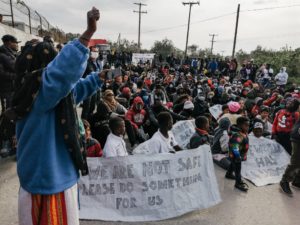
23 April: 300 people, mainly from sub-Saharan Africa, take to the streets of Moria, Greece, to protest the lack of health and security measures in the grossly overcrowded camp during the current pandemic, as it emerges that plans to relocate thousands to the mainland are stalled. (Are You Syrious, 23 April 2020)
23 April: The first cases of Covid-19 are discovered in a Danish asylum centre, the Immigration Service reveals. (Are You Syrious, 23 April 2020)
23 April: The Irish Ombudsman says the highly contagious nature of Covid-19 highlights the unsuitability and unsustainability of some Direct Provision accommodation where three or more people share a room. Although 650 new beds have been made available under emergency measures, an outbreak of Covid-19 at a Direct Provision centre in Co Kerry has led to criticisms of dispersal. (Journal.ie; Irish Times, 23 April 2020)
24 April: A lack of food leads to a protest in Ponte Galeria detention centre, Rome, which police suppress quickly with beatings, causing one victim to be taken to the infirmary. (Are You Syrious, 25 April 2020)
24 April: As part of an agreement on migration between Greek migration minister George Koumoutsakos and his Dutch counterpart Ankie Broekers-Knol, the Dutch government is to give Greece a 62-bed mobile hospital unit for refugee facilities. (Ekathimerini, 25 April 2020)
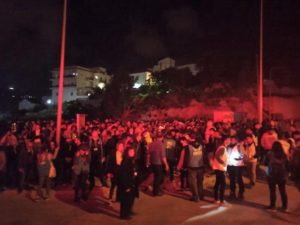
25 April: Residents of Malakasa Camp in Attica, Greece, report frequent water cuts throughout the camp, severely impacting residents’ ability to wash their hands and keep safe during the pandemic. (Are You Syrious, 25 April 2020)
26-27 April: Up to 500 displaced people are left homeless after two fires break out in a refugee camp designed for 650 people but accommodating 7,000 on the Greek island of Samos. (Al Jazeera, 27 April 2020)
29 April: The Initiative of Doctors of Lesvos alleges racist practices at a hospital in Mytilene after a young African man taken there from Moria dies, they claim, from medical neglect. (Facebook, 29 April 2020)
BORDERS AND INTERNAL CONTROLS
24 April: It is reported that the coronavirus pandemic is causing groups of migrants to return to their countries of origin clandestinely from Spain, paying up to €5,400 for the journey home (Público, 24 April 2020)
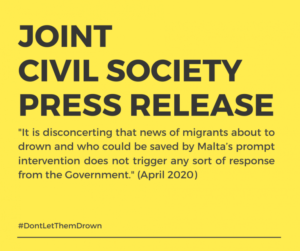 1 May: After a public outcry leading 28 organisations to sign an open letter to the Maltese government demanding information on the deaths of up to 12 people on a boat left to drift for days and the return to Libya of survivors, prime minister Robert Abela admits to commissioning the fishing boat that carried out what he called the ‘rescue mission not a pushback’. (Times of Malta, 29 April; Times of Malta, 1 May; Aditus, 30 April 2020)
1 May: After a public outcry leading 28 organisations to sign an open letter to the Maltese government demanding information on the deaths of up to 12 people on a boat left to drift for days and the return to Libya of survivors, prime minister Robert Abela admits to commissioning the fishing boat that carried out what he called the ‘rescue mission not a pushback’. (Times of Malta, 29 April; Times of Malta, 1 May; Aditus, 30 April 2020)
1 May: A former judge of the European Court of Human Rights condemns Malta’s pushback of migrants to Libya as a violation of their human rights. (Times of Malta, 1 May 2020)
2 May: Over 100 people attempt to cross the English Channel and are intercepted by British officials, as home secretary Priti Patel plans to meet her French counterpart to discuss the return to France of all those intercepted. (InfoMigrants; Are You Syrious, 4 May 2020)
4 May: The 180 people quarantined on the Italian ferry Raffaele Rubattino for 14 days after rescue at sea by the Alan Kurdi followed by a standoff off the Italian coast, are finally allowed to disembark in Palermo. (The Local, 2 May 2020)
DEPORTATION
29 April: The Supreme Court rules that seriously ill migrants cannot be deported to countries where life-saving treatment is unavailable. (Free Movement, 1 May 2020)
CITIZENSHIP
25 April: Belgian-Moroccan national Ali Aarrass, released on 2 April after a 12-year ordeal of detention, extradition, torture, wrongful conviction and solitary confinement, wins a case against Belgium, which refuses to allow his return. The court rules that the Belgian state must pay €5,000 per day while he is denied entry. (Le Soir (€), 1 May 2020)
4 May: Ali Aarrass remains stranded in Morocco despite the court ruling requiring his return to Belgium. (Yabilabi, 3 May; Luk Vervaet blogspot, 4 May 2020)
ELECTORAL POLITICS
1 May: As the Covid-19 death toll rises in Sweden, and former chief epidemiologist Johan Giesecke links the failure to protect the elderly in nursing homes to ‘asylum seekers’ and ‘refugees’ on the staff who ‘may not always be understanding the information’, the Sweden Democrats claim that the health of elderly people has been put at risk for the sake of integrating uneducated immigrants. (Guardian, 1 May 2020)
4 May: Government minister and former education secretary Michael Gove and his Daily Mail journalist wife Sarah Vine are criticised after she tweets a photograph showing books on their shelves by far-right authors including Holocaust denier David Irving, as well as ‘race science’ book The Bell Curve. (Metro, 4 May 2020)
ANTI-FASCISM AND THE FAR RIGHT
29 April: A suspected far-right extremist, named only as Stephan E, is formally charged with the murder of German CDU politician Walter Lübcke in June 2019, with another man charged with acting as an accessory to the murder by training him in the use of guns. (Deutsche Welle, 29 April 2020)
EMPLOYMENT AND EXPLOITATION
22 April: In Cyprus, the labour ministry says that in a bid to boost the agricultural sector asylum seekers can now apply for seasonal work while Covid-19 restrictions are in place. The migration department also extends residence permits for seasonal work for a period of three months. (Cyprus Mail, 22 April 2020)
22 April: Germany’s Federal Ministry of Food and Agriculture announces that asylum seekers without work permits will be able to work in agricultural jobs until 1 October, as part of an attempt to fill the shortages in the industry due to Covid-19 at the critical harvest season. (InfoMigrants 22 April 2020)
28 April: After health secretary Matt Hancock says families of NHS and social care workers who died after contracting Covid-19 at work will receive a £60,000 payout, unions including Unite and USDAW say other key workers, including bus drivers and shop workers, should receive the payout, which should be increased. (Guardian, 28 April 2020)
30 April: A survey by Strathclyde University finds that thousands of low-paid call centre workers deemed ‘essential or emergency’ workers by their bosses (one in five dispute this), have been forced to work in dangerous jobs even in centres where colleagues have already died or fallen ill with coronavirus. (Open Democracy, 30 April 2020)
1 May: The Guardian reports on 100,000 cruise ship workers stranded on ships for weeks, often unpaid and unable to land, despite the embarkation and repatriation of passengers. (Guardian, 1 May; Guardian, 5 May 2020)
1 May: The Italian labour unions Flai and CGIL organise an initiative for international workers’ day in support of 300 foreign workers who are stranded in tent cities in Sicily, donating food and money, demonstrating and calling for their regularisation, legal job contracts, healthcare protection and decent work conditions. (InfoMigrants, 4 May 2020)
1 May: The UN warns that migrant agricultural workers in the Spanish provinces of Huelva and Almeria, quarantined in settlements by the army, are living in cardboard and plastic shelters without food or running water. Ethical Consumer is crowdfunding to support trades unions bringing them supplies, and a coalition of 27 NGOS has called for regularisation of migrant farm workers as well as proper protection from Covid-19. (Guardian, 1 May 2020)
2 May: The ‘Isadora de Valencia’ single-parent women’s collective in Spain condemns racial discrimination in employment, reporting that a Colombian user of its day centre who applied for a domestic worker job was rejected because she was not white. (El Diario, 2 May 2020).
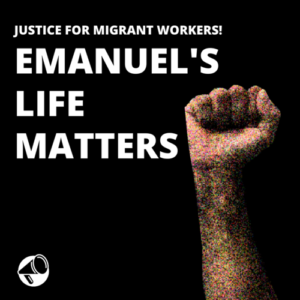
4 May: Trade union United Voices of the World raises concerns over the treatment of outsourced workers excluded from occupational sick pay, citing the death of a cleaner at the Ministry of Justice who had continued to work in near-empty offices for fear of losing income, and the alleged suspension of another cleaner raising coronavirus concerns with employer OCS. (Guardian, 4 May 2020)
4-5 May: Trades unions express anger over non-binding guidelines issued by the government allowing employers to decide on safety, cleaning and PPE, under which they say ‘bad bosses will be able to expose workers to infection without fear of consequences’. Labour leader Keir Starmer calls for clear, binding safety rules with sanctions for employers who break them. (Guardian, 4 May; Guardian, 5 May 2020)
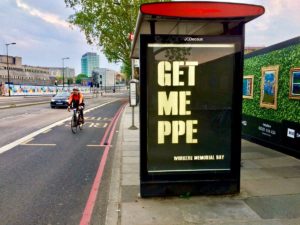
6 May: After reports that five care workers sacked after raising concerns about understaffing and PPE shortages at care homes are considering legal action, charity Compassion in Care reveals that 170 care workers have called its whistleblowing helpline with similar concerns since the start of the outbreak. (Guardian, 30 April; Guardian, 6 May 2020)
WELFARE
21 April: Tens of thousands of the 1.5m households claiming universal credit during the coronavirus crisis are set to lose out on vital financial support due to benefit restrictions on larger families  such as the two-child cap which denies support to third and subsequent children born after April 2017, say anti-poverty campaigners, calling for the cap’s removal. (Guardian, 21 April 2020)
such as the two-child cap which denies support to third and subsequent children born after April 2017, say anti-poverty campaigners, calling for the cap’s removal. (Guardian, 21 April 2020)
28 April: The collective of Ghanaian immigrants in Lorca, Spain, contributes €1880 in donations to the City Council solidarity fund, which is directed to the purchasing of protection equipment and food for vulnerable families during the pandemic. (El Diario, 28 April 2020).
28 April: The coronavirus lockdown is creating a stark digital divide, according to frontline community groups and charities, as 1.9 million households are without access to internet and tens of millions more are reliant on pay-as-you-go services to make phone calls or access healthcare, education and benefits online. (Guardian, 28 April 2020)
1 May: Errol Graham, a 57-year-old grandfather who died of starvation when his benefits were cut off, had become so mentally ill that his family believe he pulled out two of his own teeth with pliers, they reveal as fresh details of the case emerge. (Guardian, 1 May 2020)
3 May: The Food Foundation reports that nearly a fifth of households with children in the UK have been unable to access enough food during the crisis, with many parents unable to download or redeem food vouchers for children eligible for free school meals. (Observer, 3 May 2020)
HOUSING
21 April: After over 100 residents living in a block of flats in Somerford Grove, east London, signed a letter to their management agency and the building’s billionaire corporate landlords seeking a 20 percent reduction in rent and an agreement that no tenant would be evicted during the coronavirus pandemic, the letting agent, Tower Quay properties says their request is ‘unreasonable’ and ‘unrealistic’, and that any drop in tenants’ income would be offset by a reduction in spending on holidays, entertainment, travel, clothes and lunches. (Guardian, 21 April 2020)
22 April: The Greek migration ministry announces that 2,380 ‘vulnerable persons’ will be moved out of camps on the Aegean islands to apartments, hotels and other camps on the mainland. (InfoMigrants, April 2020)
27 April: Charities report an alarming number of newly homeless people on the streets, mostly hospitality workers, many migrants, who lost their jobs at the beginning of the lockdown. (Guardian, 27 April 2020)
28 April: The NGO Asnuci rents a warehouse in Lepe, Spain, that will be converted through individual donations into a hostel to house temporary migrant workers who come to work in the area as strawberry pickers and are forced to live in local shanty towns with extremely poor living conditions (Público, 28 April 2020)
EDUCATION
23 April: Edinburgh University Students’ Union (EUSA) calls for Edifess, an online student confession page, to remove a post claiming the Pakistani Society is an ‘incestuous’ group who ‘literally get married to their cousins’, which EUSA’s vice president states is ‘clearly racist’. (The Tab Edinburgh, 23 April 2020)
25 April: While GCSEs, A-levels and Sats are cancelled due to the coronavirus outbreak, research by the Guardian reveals that the 11-plus test, which gives entry to the UK’s grammar schools, will go ahead, a decision likely to widen the country’s educational gap, as the grammar school sector already has very low numbers of working-class children. (Guardian, 25 April 2020)
26 April: With the number of vulnerable children turning up at schools kept open during the outbreak far below official expectations, council officials are raising concerns that the number of those needing help from schools and social services will grow, while the lockdown makes tracking new and worsening cases extremely hard. (Guardian, 26 April 2020)
27 April: The chief inspector of schools in England says the attainment gap between the poorest, lowest-achieving and least motivated children and their wealthier peers will widen as a result of school closures. (Guardian, 27 April 2020)
1 May: Virendra Sharma, MP for Ealing Southall, writes to the education secretary calling for universities to ringfence money from hardship funds for international students, as student groups and charities reveal that thousands of Indian students unable to leave the UK due to lockdown are relying on their food donations to avoid starvation, with some evicted from their accommodation. (Guardian, 1 May 2020)
1 May: Holyrood reports that at least 60 asylum seeking families across Scotland awaiting asylum decisions cannot afford to access the internet, leaving vulnerable children isolated and unable to engage with educational resources during lockdown. (Holyrood, 1 May 2020)
4 May: Head teachers on standby for schools in England to reopen as early as next month as part of government plans to ease the Covid-19 lockdown are worried it may be too soon and remain anxious about the safety of colleagues and pupils. (Guardian, 4 May 2020)
MEDIA AND CULTURE
2 May: The Guardian reports that OFCOM has received at least 888 complaints over the Channel 4 Dispatches programme The Truth about Traveller Crime, shown on 16 April, which has reportedly led to a rise in hate crime towards the Gypsy, Roma and Traveller community. Friends, Families and Travellers (FFT) has passed 7,308 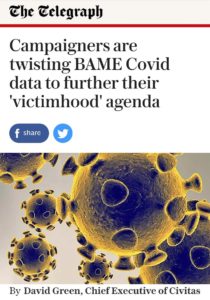 complaints about the ‘dehumanising, unbalanced and unfair’ show to the broadcasting regulator, and the Traveller Movement is pursuing legal action against the broadcaster. (Guardian, 2 May 2020)
complaints about the ‘dehumanising, unbalanced and unfair’ show to the broadcasting regulator, and the Traveller Movement is pursuing legal action against the broadcaster. (Guardian, 2 May 2020)
4 May: The Telegraph carries an article by David Green, chief executive of think tank Civitas, who dismisses campaigners’ concerns over the disproportionate number of BAME deaths by Covid-19 as ‘interpreting statistical disparities as proof of ethnic victimhood’.(Telegraph (£), 4 May 2020)
VIOLENCE AND HARASSMENT
COVID-19 STIGMATISATION AND RELATED VIOLENCE
April: The Roma Support Group reports that false images have been circulating online purporting to show that Roma from Govanhill, Glasgow, have been breaking coronavirus restrictions. The images were taken before lockdown and from different cities. (Roma Support Group, April newsletter; Glasgow Times, 11 April 2020)
29 April: The New Statesman publishes evidence from digital extremism monitor Moonshot revealing a spike in online violent anti-Chinese sentiment, conspiracy theories and anti-Semitism during the coronavirus outbreak. (New Statesman, 29 April 2020)
3 May: Actor Jason Wong speaks out about racism experienced by East Asian communities after being racially profiled in a London newsagent’s by a stranger who remarks ‘you might have coronavirus’. (Huffington Post, 3 May 2020)
5 May: Police figures reveal that hate crimes against Chinese people in the UK soared in the first three months of 2020, as the Covid-19 crisis unfolded. (Sky News, 5 May 2020)
VIOLENCE AND HARASSMENT – GENERAL
For more information on racial violence and related migration issues in Lesvos, please follow the Voices of Freedom blog.
21 April: The Thessaloniki prosecution opens an investigation into a video showing a football fan forcing a migrant to cross himself, repeat prayers in Greek and renounce Islam in front of a church. (Ekathimerini, 21 April 2020)
22 April: Two refugees from the Moria camp are hospitalised after an unidentified man with a hunting rifle fired shots into the camp. (Guardian, 23 April 2020)
23 April: A 33-year-old man is jailed after a racist rampage in Birmingham in which he abused, threatened and punched a taxi driver, hit a lollipop man with his own road sign and shouted racist abuse at children. (Birmingham Mail, 23 April 2020)
24 April: Bin crew workers in the Stroud district report being subjected to racist abuse and put at risk by dangerous drivers in a spate of incidents during the lockdown. (Stroud News & Journal, 24 April 2020
24-27 April Seventy far-right activists come out to support the 55-year-old man accused of shooting refugees at Moria, throwing stones at journalists on the first day. The police make no effort to disperse them, despite Covid-19 lockdown measures, and tell journalists to leave for their own safety. The shooter, charged with attempted premediated murder, says he believed the refugees were trespassing on his land to steal animals, and is given pre-trial bail. (Twitter; Al Jazeera, 27 April; Legal Centre Lesvos, 28 April 2020)
25 April: Police issue an appeal for witnesses after a 21-year-old man is racially abused, threatened and assaulted in King George V Park, Edinburgh, by a group of four men. (Edinburgh News, 26 April 2020)
26 April: Data released by the Swiss Federal Commission Against Racism reveals a record 352 racist incidents noted in 2019, with Black and Muslim communities most impacted by an increase in racist acts in public places and attacks by the far Right who were involved in a tenth of attacks. (Swissinfo, 26 April 2020)
26 April: A 21-year-old woman, her father and a friend are subjected to racist abuse at the family’s restaurant in Alnwick by three people. Two men and a woman are arrested. (Chronicle Live, 1 May 2020)
27 April: A woman is arrested after screaming ‘Jews are racist! Heil Hitler’ and trying to break down the front door of a Jewish home in Stamford Hill. It is reported by Shomrim, the Jewish volunteer neighbourhood watch patrol. (Antisemitism UK, 28 April 2020)
27 April: Lincolnshire police appeal for witnesses and information about an assault on 25 April outside Castle Sports Complex, Spalding by three offenders on pushbikes, who called the victim ‘immigrant’. (Lincolnshire Police, 27 April 2020)
29 April: A woman is arrested after she abused and racially assaulted another woman passenger on a bus in Redditch, Worcestershire. (The Shuttle, 30 April 2020)
30 April: A 29-year-old Kent man pleads guilty to racially aggravated assault and public order offences after racially abusing a shop worker and a bystander, spitting at a police officer and threatening to kill his family on 26 April. He is remanded in custody. (Kent Online, 30 April 2020)
2 May: A 47-year-old man is banned from a Brighton Aldi after admitting two counts of racially aggravated harassment, involving spouting racist abuse at staff. (The Argus, 2 May 2020)
The calendar was compiled by the IRR News team with the help of Aisha Rana-Deshmukh, Laura Wormington, Jessica Pandian, Graeme Atkinson and Joseph Maggs.

